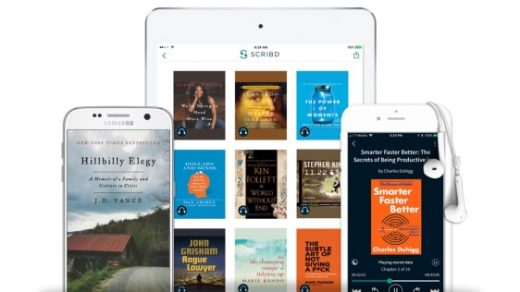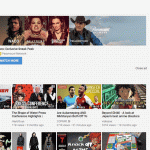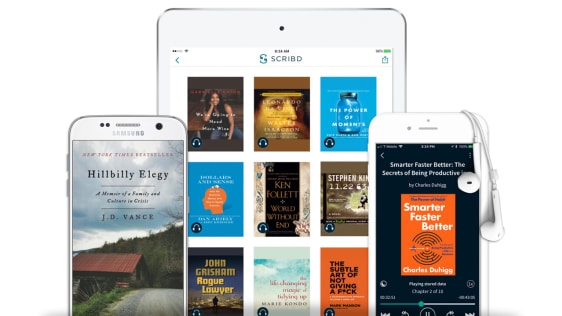Scribd’s Quest To Be “The Netflix Of Reading” Is Finally Paying Off
Why own a few pieces of media when you can rent access to everything? That pitch defines Netflix, which evolved from an all-you-can-watch DVD service into the kingpin of streaming video. Music followed a similar route, with services such as Spotify offering millions of songs for a monthly fee. And now may be the time for digital book subscriptions to go mainstream.
Amazon stepped into e-book rentals in 2014 with its $10-per-month Kindle Unlimited service—providing just a portion of what Kindle offers for sale, and generally not the biggest titles. But a small competitor named Scribd started even earlier and offers larger quantities of popular content—for a buck less. In the past year, it’s grown subscribers by over 40% to 700,000 (still well behind Kindle Unlimited’s estimated 2.5 million-plus) and has started making a steady monthly profit. After introducing unlimited reading and then moving away from it, the company is bringing it back, with some limitations designed to make it economically viable.
Launched in 2007, Scribd began as a PDF-hosting service. To this day, if you see a corporate slide deck or a legal document like the Devin Nunes Trump investigation memo embedded in a viewer window in an article, it’s probably hosted on Scribd. This portion of the business accounts for the overwhelming amount of traffic, about 100 million visitors per month.
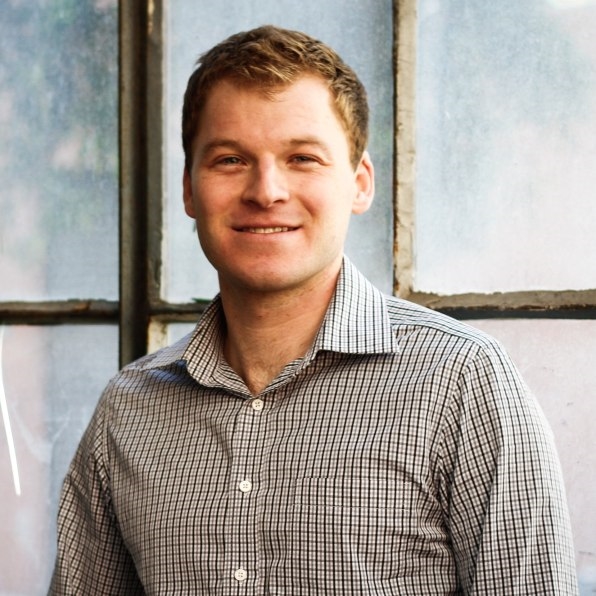
“It was always a success from a traffic standpoint, but it didn’t have a business model attached to it,” says Scribd’s CEO and cofounder, Trip Adler. In 2013, with Amazon’s Kindle e-book-selling business well established, and Barnes & Noble’s Nook challenger already faltering, tiny, unprofitable Scribd stepped in with an alternative: reading e-books through a monthly subscription.
Scribd has since added audio books, magazines, newspapers, and sheet music, and hopes to add podcasts this year, says Adler. And the month-to-month subscription fee remains $9. But plenty of missteps over the years show the challenges of understanding how people read as technology keeps changing. In 2011, Scribd introduced Float, a newsreader app a bit like Flipboard, which soon flopped. Comic books, added in 2015, were gone by 2017, due to a lack of user interest, says Scribd.
In 2010, Scribd introduced a new design focused on social sharing. “They sort of self-declared themselves to be the social network of the book world,” says Lior Zalmanson, a professor of information and knowledge management at the University of Haifa in Israel, who researches the community aspects of media. Adler admits that the experiment didn’t go as planned. In 2014, Scribd redesigned its site to look more like Netflix than Facebook.
Most jarring, in 2016, the company switched off unlimited reading because a small minority of users was gobbling up enough books to threaten the whole offering. “We have people who would read 100 books per month,” says Adler. Most of these superusers were devouring romance novels, with some bingeing on mystery books and young adult fiction. These were far from the most expensive titles, but they were adding up. “We have some scientific and technical books in the service that are like $50 or over $100 [per read],” says Adler. “But usually people who read those only read a few books a year.” To keep from going under, Scribd ended unlimited reading and began offering three e-books and one audiobook per month in February 2016.
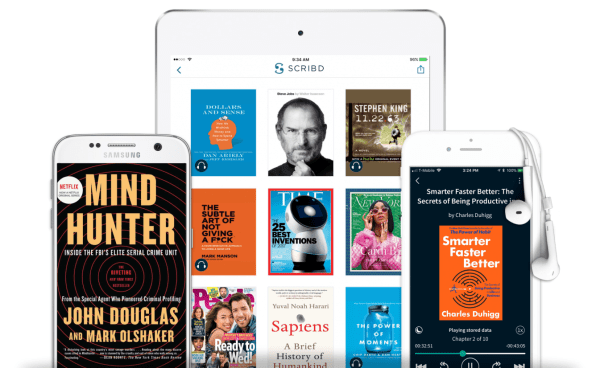
Superusers may make up a tiny percentage of a company’s user base, but they can trigger a widespread backlash if they feel jilted, says Zalmanson. He gives Scribd high marks for how it explained the need for the policy change. “I think they’ve … discussed it with the community in the most frank and open way that they could,” he says.
Curtailing its original unlimited plan bought Scribd breathing room to work on a better strategy. It’s once again calling the service unlimited—with an asterisk. In the textual equivalent of a wireless carrier offering unlimited data but throttling speeds for bandwidth hogs, people who read a very high number of books (which Adler won’t specify, saying that it’s still subject to tweaking) in a given month will get access to a smaller selection of titles until the next billing cycle begins. This will affect up to 8% of readers.
Enough Is Enough
E-books continue to form the heart of Scribd’s offering. “When you say, ‘We’re going to give you unlimited books for nine dollars a month, that sounds like a really good deal,’” says Adler. (If you do your digital reading by purchasing individual Kindle e-books, you’d likely pay more than that for a single title.) However, with fewer than one million titles the offering has never been “unlimited.” (Amazon offers around 3.4 million titles available for individual purchase on Kindle, and more than a million through the Kindle Unlimited service.)
Although Scribd has built relationships with the biggest publishers and many smaller ones, plenty of titles are missing. Going through a recent New York Times best-seller lists, I found just over half available as e-books on Scribd. Pierce Brown’s Iron Gold and Walter Isaacson’s Leonardo Da Vinci were available; Neil deGrasse Tyson’s Astrophysics For People In A Hurry and Douglas Preston and Lincoln Child’s City Of Endless Night were not. That’s a lot better than on Kindle Unlimited, which had none of the best-sellers I checked.
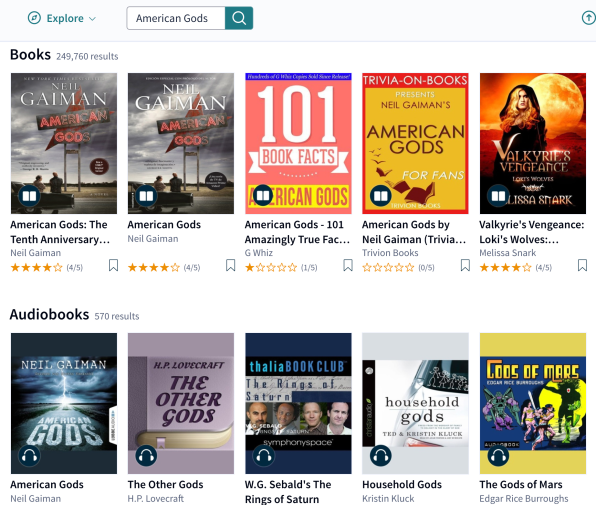
I had less luck searching Scribd for new and not-so-new titles I’ve been buying as Kindle e-books. Neither Andy Weir’s Artemis nor most titles in James S. A. Corey’s The Expanse series were available, for instance; but Neil Gaiman’s American Gods was. (Kindle Unlimited has only the Spanish version of American Gods.)
The gaps are no surprise to Tien Tzuo, CEO of Zuora, which supplies subscription management services for media companies like The Guardian and HBO (but not Scribd). If a publisher thinks it can make more money on single purchases, it may not offer a book on a subscription service, at least when it first comes out, he says. Or it may offer a taste of some books on subscription services in order to entice readers to buy others.
Scribd’s Audiobooks help fill gaps on my recently read list, like Yuval Noah Harari’s Homo Deus, Ron Chernow’s Alexander Hamilton, and David Jaher’s The Witch of Lime Street. In fact I had “read” the last two as audiobooks from Amazon’s $15/month Audible service. (Kindle Unlimited’s audiobooks are mostly limited to romance novels.) The audiobooks alone would justify a Scribd account. And I could get Artemis or Astrophysics For People In A Hurry somewhere else, even as Kindle purchases, and still save money.
“I think the idea that you have to have everything is an antiquated idea,” says Tzuo. “Netflix has less shows now than when it [only] had DVDs, but it has ten times more subscribers.” There’s already more to watch on Netflix than most people have time for. As long as there’s enough “good stuff” to keep viewers busy, they’re happy.
The Limits of Unlimited
Even if Scribd’s Netflix-like ambitions appeal to book lovers, they could pose future challenges, says Robbie Kellman Baxter, a business consultant and author of the 2015 book The Membership Economy. As a small player compared to Amazon, Scribd may be a safe place for publishers to experiment with subscription models, according to Baxter. “I would expect that Scribd probably has some really nice deals with them, because the publishers are trying to learn and also because the publishers don’t want to work with Amazon,” she says. (Amazon dominates the e-book market with 83% of sales as of a year ago, giving it a degree of power that publishers would be happy to see erode over time.)
Still, if Scribd follows the path of Netflix, it could face much higher licensing fees, warns Baxter. Netflix can no longer sign deals with the same attractive terms it negotiated in its early days, when it was small and Hollywood saw streaming as incremental revenue. Netflix’s strategy has been to cut back on what it licenses and produce its own shows and movies, and Baxter suggests Scribd might do something similar with a self-publishing platform. (Already, Amazon lets anyone offer e-books via the Kindle platform.) Scribd says it has no immediate plans to introduce such an offering, but points out that its PDF-hosting service already allows users to publish text online.
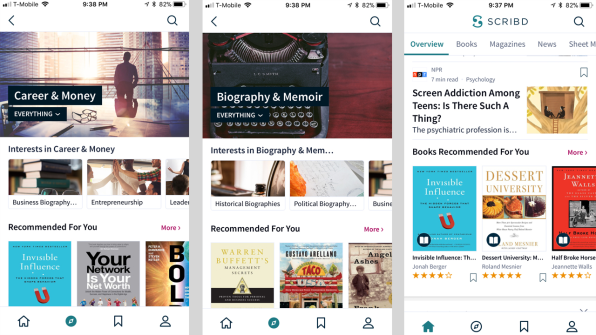
Already, Scribd is bulking up by offering content that’s typically been free on the web: newspapers and magazines (including Fast Company). “We’re trying to have pretty much every magazine in the world for $9 a month,” says Adler. The company just added Hearst (with titles like Cosmopolitan and Esquire) to a roster of about 90 brands, including the New York Times, the Wall Street Journal, New York, and other heavyweights as well as smaller specialty publications.
As more publications erect paywalls, this part of a Scribd subscription could look more valuable, but the math is tricky. Scribd offers more New York Times articles than the five per month that the paper’s website and app allow to freeloaders, but it only offers a portion of all articles: Selections from the Wall Street Journal and Financial times can be quite stale, yet Bloomberg Businessweek has richer offerings.
Magazines and newspapers are even more in flux than digital books. After decades of giving content away, ever more publications are finding that readers will pay. It started with must-read sites like the New York Times and Wall Street Journal. Then liberal-leaning publications like The Atlantic got a boost from readers opposed to Trump. Now a broader swath of magazines, such as Wired is also jumping on.
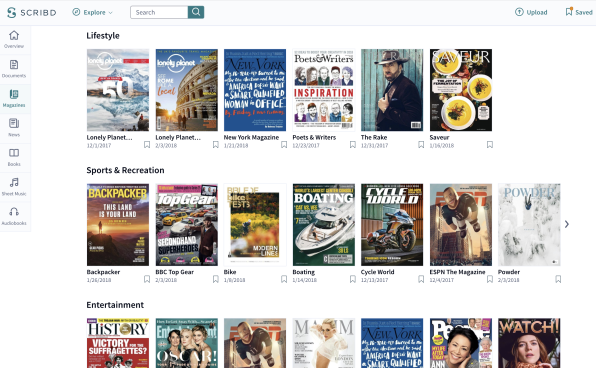
“What this demonstrates is that some media businesses are prepared to experiment, innovate. and try ways to flourish (financially and creatively) in the digital age,” writes University of Oregon journalism professor Damian Radcliffe in an email. “But it also shows that financial and distribution strategies can turn on a dime too.”
If the move to paywalls continues, a subscription service bundling a wide selection of publications may look good to readers, but top publishers might do fine on their own, no Scribd-like middleman required. “If you’re the New York Times, in the digital world, why do you need an intermediary?” says Zuora’s Tzuo.
Adler says that bundling will keep readers from feeling overwhelmed by so many subscription sites. “If you had just one subscription that pays for everything, you could really increase the number of people that are paying for content,” he says. “Then there’s a lot more revenue to pass back to these magazines and newspapers.”
It’s the win-win scenario that he pitches to publishers of books, magazines, and other items. Adding more publishers creates a better deal for subscribers; adding more subscribers creates a better deal for publishers. The future of Scribd, and all subscription models, depends on continually balancing those interests.
Fast Company , Read Full Story
(39)

